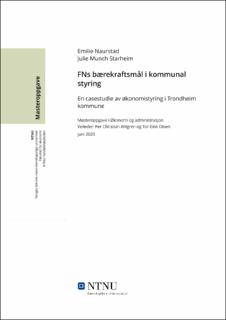| dc.contributor.advisor | Ahlgren, Per Christian | |
| dc.contributor.advisor | Olsen, Tor-Eirik | |
| dc.contributor.author | Naurstad, Emilie | |
| dc.contributor.author | Starheim, Julie Munch | |
| dc.date.accessioned | 2021-09-14T17:16:14Z | |
| dc.date.available | 2021-09-14T17:16:14Z | |
| dc.date.issued | 2020 | |
| dc.identifier | no.ntnu:inspera:55685018:61635372 | |
| dc.identifier.uri | https://hdl.handle.net/11250/2777183 | |
| dc.description.abstract | I 2019 la Regjeringen fram en forventning om at FNs 17 bærekraftsmål skal legges til grunn for kommunal planlegging. For å belyse temaet FNs bærekraftsmål i kommunal styring har vi studert Trondheim kommune, med sin status som FN-senter og sine prosjekter og samarbeid som støtter en bærekraftig omstilling. Vi har utarbeidet følgende problemstilling:
«Hvorfor innfører Trondheim kommune FNs bærekraftsmål i sin styring, og hvordan gjennomføres denne strategiske fornyelsen?»
Vi har drøftet problemstillingen i lys av ulike teoretiske perspektiver, der rammeverket Levers of Control og elementer fra institusjonell teori står sentralt. Studien er en kvalitativ casestudie og vi har gjennomført dybdeintervjuer og dokumentstudier for å studere hvilke faktorer som påvirker kommunens initiativer, og hvordan ulike styringssystemer brukes i innføringsprosessen.
Våre funn viser at kommunen bruker eksisterende styringssystemer for å innføre FNs bærekraftsmål i sin styring. Dette innebærer særlig kommuneplanens samfunnsdel, handlings- og økonomiplanen, budsjetter og mål- og resultatstyring, der bærekraftsmålene tilpasses lokale forhold. I tillegg utvikler kommunen et budsjetteringsverktøy som heter SDG-budsjettering, som skal synliggjøre informasjon og støtte ressursprioriteringer for å nå bærekraftsmålene. Videre viser studien at innføringen først og fremst involverer ansatte på ledelsesnivå, samtidig som det arbeides med å utvide denne involveringen til en større del av kommunen.
I innføringsprosessen finner vi også et tydelig fokus på samarbeid og prosjekter. Det samarbeides internt i Trondheim kommune, sammen med eksterne aktører i privat og offentlig sektor, og sammen med innbyggere i kommunen. Det er et økende fokus på bærekraft internt i organisasjonen og fra samfunnet for øvrig. Dette støtter kommunens arbeid for bærekraftig utvikling, samtidig som det fører med seg forventninger til arbeidet. Likevel finner vi et behov for å utvikle forståelsen av kompleksiteten ved bærekraftsmålene og en usikkerhet knyttet til hvilke effekter innføringen vil medføre. Vår studie tyder på at det er behov for bærekraftig omstilling der FNs bærekraftsmål spiller en sentral rolle. I dette arbeidet operasjonaliseres bærekraftsmålene ved å videreutvikle eksisterende styringssystemer i kommunen. | |
| dc.description.abstract | In 2019, the government of Norway announced an expectation that the UN's 17 sustainable development goals (SDGs) will form the basis for municipal planning. To elucidate the topic of the UN's sustainable development goals in municipal management we have studied Trondheim municipality, which have status as a Geneva UN Centre of Excellence on SDG City Transition. The following research question has been formulated:
«Why is Trondheim municipality implementing the UN's sustainable development goals in its management control systems, and how is this strategic renewal implemented?»
We have addressed the research question using various theoretical perspectives, where the focus has been on the Levers of Control framework and elements from institutional theory. Our study is a qualitative case study, where in-depth interviews and document studies have been conducted to examine which factors influence the municipality's initiatives, and how different management control systems are used in the implementation process.
Our findings show that the municipality uses existing management control systems to implement the SDGs in its management control systems. This especially includes plans, budgets and performance management, where the SDGs are adapted to local conditions. In addition, the municipality is developing a budgeting tool called SDG budgeting, which aims to highlight information for resource priorities, herein contributing in achieving the SDGs. Furthermore, our findings show that employees primarily at the management level are involved in the implementation process, while at the same time efforts are being made to extend this involvement to a larger part of the municipality.
We also find an evident focus on cooperation to achieve the SDGs, both within the municipality, with residents and with other actors in the private and public sector. An increasing focus on sustainability within the organization and from the society encourages the municipality to work for a sustainable development. However, it may also bring expectations and may cause demands from external parties. Nevertheless, we find a need to increase the understanding of the complexity of the SDGs, as well as uncertainty about what effects the implementation will have. Our study indicates a need for sustainable change where the SDGs play a key role. In this work, the goals are operationalized by further developing existing management control systems. | |
| dc.language | | |
| dc.publisher | NTNU | |
| dc.title | FNs bærekraftsmål i kommunal styring | |
| dc.type | Master thesis | |
